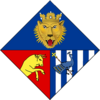Vathy
Vathy
Βαθύ (Hellenic) Ϝάστυ Βαθέος | |
|---|---|
| Borough of Vathy | |
| Βαθὐ transcription(s) | |
| • Romanisation | Vaþý |
| Mottoes: | |
| Anthem: «Ὕμνος εἰς τὴν Ἑλευθερίαν» "Hymn to Liberty" | |
| Map of Samos, Greece Coordinates: 37°45'28.7"N 26°58'21.8"E | |
| Micronation | |
| Voivodeship | |
| Established | 10 March 2021 |
| Founded by | Quintus De Vitaliis |
| Seat | Castrum Vatheos, Naval street |
| Government | |
| • High Burghermistress | Sophia-Diamantē Dimitrijević-De Vitaliis |
| Demonyms | Βαθιώτης (m.), Βαθιώτις (f.) |
| Languages | |
| • Official | Hellenic |
| Time zone | UTC+02:15 (Græcian Eastern Time) |
| • Summer (DST) | UTC+03:15 (Græcian Eastern Summer Time) |
| Postal code | |
| Area code | +30 |
| Vehicle registration | VA |
The Borough of Vathy (Hellenic: Ϝάστυ Βαθέος, romanised: Wásty Vaþéos, pronounced: [ˈwasti vaˈθe.os]) is one of the boroughs of Græcia, the second-level administrative divisions of the micronation. It was formed in March 2021 AD, located in Vathy, Samos island, Hellas.
Name
The Borough of Vathy was named after the homonymous surrounding macronational city.
History
The Borough of Vathy was formed on 10 March 2021 AD, alongside the boroughs of Perusia, Sarajbosna, and Sisypheia.
Government
Current High Burghermistress: Sophia-Diamantē Dimitrijević-De Vitaliis
The Borough assembly is composed of 5 counselors.
Economy
The Borough of Vathy depends on both local consumption and tourism. The borough's area of influence includes a handful restaurants, taverns and cafés, super markets, and other businesses.
Geography
The Borough of Vathy is located entirely within the town of Samos, colloquially still known as Vathy. Its area of influence covers a small portion of the macronational settlement.
Demographics
Population
| Population (2023) | Citizens (2023) | Other subjects (2023) |
|---|---|---|
| 9 | 8 | 1 |
Religion
The inhabitants of the Borough are Greek Orthodox Christians. The patron saint of the Borough is the Apostle and Evangelist Saint John the Theologian, whose feast is celebrated on 8 May.
Language
The official language of the Borough is Hellenic, which is used for official documents, as well as everyday things. People who are involved in tourist business might speak a few Turkish, but it is insignificant and thus the language is not recognised whatsoever.

